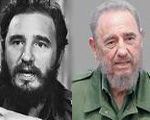
After reigning for 49 years Fidel Castro, the Cuban President, announced, “I will not aspire nor accept—I repeat I will not aspire or accept—the post of President of the Council of State and Commander in Chief,” on February 19, citing his health to be main reason behind his decision.
His decision to retire got a mixed response in the island nation the only communist country in the Western hemisphere, which has juggled with various economic crises.
Fidel came to power in 1959 after he could overthrew the brutal President Fulgencio Batista through a massive armed rebellion, Fidel was then sworn in as the Prime minister and later in 1976 he became the President and then Commander in Chief of Cuban armed forces.
The first sight of his deteriorating health appeared in 2006 and he transferred his responsibilities to his younger brother Raul Castro, the First Vice President.
This leader who survived 638 murder attempts has been called with several names including dictator by his opponent by questioning his technique through which he rose to power while supporters find him as a charismatic leader.
On his attempt to life he said, “If surviving assassination attempts were an Olympic event, I would win the gold medal.”
Under Fidel’s regime Cuba developed sour relation with America after he rejected the military pact with US and seized US establishments in Cuba and transformed Cuba’s economy into a centralised one by converting the establishments into collective farms but mostly after American soldiers tried to invade Bay of Pigs in Cuba and suffered the setback in 1961.
On December 2, 1961, Castro declared that he was a Marxist-Leninist and that Cuba was adopting Communism after several denials that he does not believe in communism. US imposed ban on Cuba which has by then developed more cordial relation with USSR.
Later in 1962 the USSR installed a medium range missile in Cuba which was capable of striking targets in the United States, thus deteriorated the relation further. This was a period of near nuclear conflict between the two countries US and USSR. USSR removed the missile in regard of US commitment that it would not attack Cuba.
After this episode Cuba suffered a major setback in its economy and after disintegration of USSR in 1991, the country’s economy plummeted and Cuba was under a major crisis. During this period millions of people from Cuba migrated to America and formed an anti-Castro community in Miami and Florida.
To fight the major crisis which engulfed more than 80% of its market Cuba legalised the US dollar, encouraged tourism and allowed transfer of remittances in US dollars from Cubans living in the USA to their relatives on the Island.
In 2001 a massive Hurricane Michelle swallowed even the remaining hope after damaging a large number of properties in Cuba and island nation after denying US humanitarian aid offered the later, one-time cash purchase of food from the US and since the ban in 1962 first time the shipment of food was allowed.
Even after the discontentment there is hope by millions of Cuban that after Fidel free market policy will be accepted by Raul who will take up as President on Tuesday. Though he has signalled for a structural change in the economy of the country and urged people to speak up openly on the faltering policies, people there are apprehensive regarding the amount of change.
Most of the Cubans after leading a miserable life wants to embrace US capitalist type of economy, various other problem that infuriate the Cubans are low salaries, restrictions on Internet access and rules that prevent most Cubans from travelling abroad. The classlessness ideology of the government confines the citizen limited access of cell phone and private vehicles which most of citizen complains.
But the legacy of Fidel Castro will remain who is still perceived as leader of the masses, who stood tall with his ideology, his work to improve education, health are undeniable. But the people back in Cuba are demanding change and perhaps his retirement could set new beginning for Cuban life.
|
|


Comments: